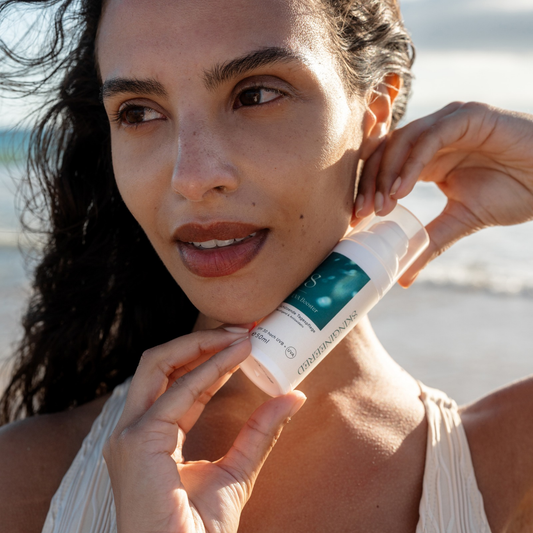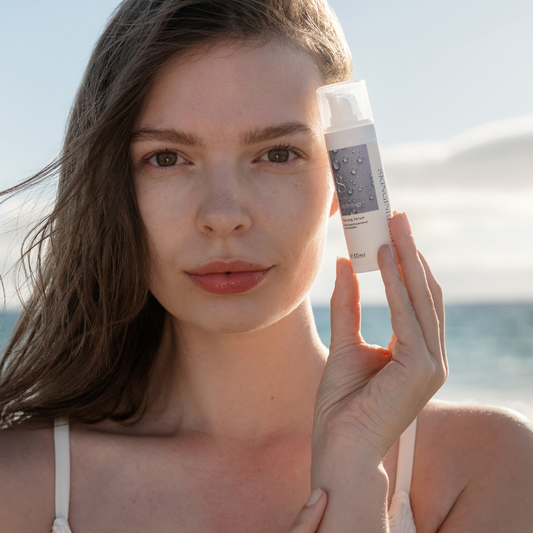Guest article by Dr. Sarah Schunter, biochemist
Sunscreen is often associated only with the hot summer months. But sunscreen is also essential in winter to protect against UV radiation. Skin remains susceptible to the sun's harmful effects all year round, especially from UVA rays, which are present even in the colder months.
overview
- Why is sun protection necessary in winter ?
- How do UVA rays affect the skin?
- Sunscreen in winter: When to use it ?
- What UVA protection should I wear in winter?
Why is sun protection necessary in winter?
Even though the sun is often hidden behind clouds during the winter months and temperatures drop, UV radiation remains a constant threat to the skin. The greatest danger comes from UVA rays , which make up 90-99% of the UV radiation reaching the Earth's surface (1).
While UV-B rays decrease significantly in winter, the intensity of UV-A radiation fluctuates less throughout the year. Although it is also lower compared to summer, it is still present (see Fig. 1) – sufficient to damage the skin.

Fig. 1. Diurnal variations of UVB (solid line) and UVA radiation (dotted line) in 1994, measured in Durham, UK. Adapted from Diffey BL et al., 2022 (2).
It is particularly important to consider the cumulative effect of UVA radiation, meaning the radiation that accumulates on the skin over time and, taken together, can have a damaging effect. For example, it can be especially insidious that UVA rays can penetrate clouds, windows, and even clothing. While many people actively use sunscreen in the summer, protection is often neglected in winter, which can continuously damage the skin. UVA radiation can also reach the skin during short walks or through the windows of offices and cars.
How do UVA rays affect the skin?
UVA rays act at the cellular level. They promote the formation of free radicals, which cause oxidative stress and attack skin cells. This process accelerates skin aging and can lead to long-term damage such as DNA changes, which increase the risk of skin cancer – again, cumulative UV exposure is important.
Furthermore, UVA rays can damage connective tissue as well as elastin and collagen fibers in the skin, leading to a loss of elasticity and firmness. Other signs of premature skin aging (photoaging) are also attributable to UVA rays: pigment-related skin changes such as age spots and melasma. Finally, the oxidative effect caused by UVA radiation can inhibit the activity of immune cells, which can subsequently affect our immune system or manifest as increased skin inflammation (3).
Sunscreen in winter: When to use it?
It turns out that even in winter, the daily application of sunscreen should be an integral part of your skincare routine. Sunscreen should be worn in winter especially when...
- the UV index rises above 3 during the day,
- You spend the day outdoors or
- for example, sitting at work in a light-flooded room.
This is how you effectively protect your skin from the harmful effects of UV radiation all year round.
What UVA protection should I wear in winter?
Not all sunscreens in Germany and Europe explicitly state their UVA protection. However, if the UVA circle symbol is shown on the packaging, you can assume that the sunscreen's UVA protection is at least one-third of its UVB protection ( SPF ). For example, an SPF of 30 would provide at least UVA protection of 10.
Theoretically, you can use products with lower UVB protection in winter, but even with an SPF of 30, the UVA protection might also be lower. Therefore, it's advisable to use a sunscreen with SPF 50 or choose sunscreens that explicitly advertise high UVA protection , such as a UVA booster .
The following applies to the use of sunscreen in winter:
- All exposed skin areas, such as face, neck, ears and hands, should be carefully covered with sunscreen.
- Especially during outdoor activities such as skiing or hiking, sun protection should be taken into account, as snow reflects up to 80% of UV radiation and can therefore significantly increase the radiation dose.
- It's important to allow the sunscreen about 20 minutes to form a film. This ensures that an even, protective film of sunscreen forms on the skin.
- Depending on your activity and how long you spend outdoors, be sure to reapply sunscreen every two hours.
- Use a lip balm with sun protection to protect the sensitive skin of your lips from UV rays.
- A rich moisturizing cream or a sunscreen that provides moisture and protects against the cold is particularly suitable for dry and sensitive skin types.
- When combined with other skincare products, sunscreen should always be applied as the last step to ensure its effectiveness.
Conclusion
Sun protection is important even in winter to protect your skin from UVA radiation. UVA radiation penetrates the skin much more easily and deeply, and can cause photoaging, pigment changes, and long-term skin damage (including skin cancer). Therefore, be sure to wear sunscreen even in winter – ideally with a sufficiently high UVA protection factor.
About the author

Dr. Sarah Schunter
Biochemist, Scientific Content Creator (Instagram: @eattraincare ) and Co-Founder at 25SEVEN .
For over 10 years, Sarah has been writing from a scientific perspective about nutrition, exercise, and skincare – three topics that go hand in hand when it comes to feeling good in your body and skin. As a consultant and scientific content creator, Sarah supports skincare brands in optimizing their products and developing scientifically sound communication strategies.
Sources:
(1) Narayanan DL, Saladi RN, Fox JL. Ultraviolet radiation and skin cancer. Int J Dermatol. 2010 Sep;49(9):978-86. doi: 10.1111/j.1365-4632.2010.04474.x. PMID: 20883261.
(2) Diffey BL. Sources and measurements of ultraviolet radiation. Methods. 2002 Sep;28(1):4-13. doi: 10.1016/s1046-2023(02)00204-9. PMID: 12231182.
(3) D'Orazio J, Jarrett S, Amaro-Ortiz A, Scott T. UV radiation and the skin. Int J Mol Sci. 2013 Jun 7;14(6):12222-48. doi: 10.3390/ijms140612222. PMID: 23749111; PMCID: PMC3709783.










1 comment
Sehr interessanter Artikel! Habe sonst nie im Winter SPF getragen, da ich es unnötig fand. Aber seit ich den UVA Booster benutze, trage ich ihn brav jeden Tag 😊.